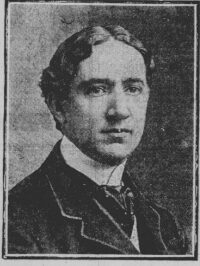[Newspaper]
Publication: The Commercial Tribune
Cincinnati, OH, United States
vol. VIII, no. 21, p. 5, col. 2 - 3
GLASSWORKERS IN
ANNUAL CONCLAVE
Delegates Gathered Here From
All Quarters of the
Country.
WAGES RAISE AN ISSUE
Manufacturers Coming To Talk With
Men on Trade Conditions.
The annual convention of the American Flint Glassworkers' Union begins this morning in the auditorium at Odd Fellows Temple. The National President, T. W. Rowe; several of the chief officers and a large number of the delegates from Pennsylvania arrived in the city and opened headquarters at the Burnet House yesterday. The convention is to be in session here two weeks, and nearly three hundred delegates are to participate in the work it will have to do. Several important questions are up for their consideration. The chief of these is the preposition to consolidate its organization with that of the Green Bottle Blowers' Association, which includes in its ranks nearly half the glassworkers in the United States. The two branches of workers have been separate for some time, but their interests are so clearly common that their members favor a getting together.
| |||
| T. W. ROWE National President American Flint Glassworkers |
The proposal to do this has been made by the flintworkers. The leaders of the bottle men have responded favorably, but with a counter proposition that, while having one National President, they should in other respects keep up their present separate National organizations. This the flintworkers do not take kindly to, and some negotiating will go on before any result is reached. The Bottle Workers' Association goes into convention here next week, so that it is likely both bodies will have the opportunity of acting together on the subject.
President Rowe was formerly an Ohio man, living at Toledo for several years.
Golden Times for Glassworkers.
"Conditions were never better for the glassworkers than they are today in the United States," Mr. Rowe said. "The wages are high in every branch of the business and the men are making more than they ever did before. There is nothing to raise any doubts as to the future, and so the glassworkers are satisfied. Our convention will pass on the new scales of wages that are going to be asked for."
"There are thirteen different branches of the flint glassworkers, and the wages paid them varies. Each branch settles on the scale it will ask for, but before it can do anything it has to get the approval of the convention, and no strike can be started without the sanction of the convention. Pennsylvania leads in the glass industries; it has more glassworkers and more glass plants than any other State. Indiana probably comes next on account of its natural gas. Ohio does not sow so big, but it is growing. You have several plants here in Cincinnati, and one of the finest in the world at Toledo."
Factories Coming to Ohio.
"Factories are crowding into Ohio from Indiana as the natural gas gives out in that State. Our union extends northward to Montreal and as far west as Illinois. The bottle blowers reach west as far as San Francisco, and they will have delegates from there in this city next week."
"No, we do not think the men have anything to fear about the introduction of automatic or machine blowers going to displace them. The machines are not perfected to work practically. Anyway, they can never do the work of men nor half as well as men. The glass made with them is of inferior quality, and has only cheapness for its merit. They have displaced no men as yet. Even if the machines were a success they would affect only one of our branches, the making of window glass; but we have no fear that they will do anything of the kind. Wages for the glassworkers range from $4 a day for the ordinary journeymen to $8 and $9 for bottle blowers. We have early 2,000 men in our National union and there are 147 local unions."
There is to be a general adjustment of wage scales for the coming year in all the departments of glass work, and on Thursday morning the convention will receive the representatives from the Glass Manufacturers' Association who come to discuss the matter of wages and work hours and regulations generally with the men. The latter are asking for increases in wages ranging from 4 to 15 per cent of their present pay, and the employers are to give their views and make known what objections they have to changes of this kind. The local union will entertain the visiting delegates during their stay here.
